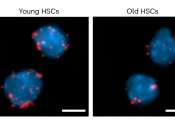Researchers reveal new cellular mechanical transducer
A research team has uncovered a novel regulator governing how cells respond to mechanical cues. Their findings appear in Nature Cell Biology.

A research team has uncovered a novel regulator governing how cells respond to mechanical cues. Their findings appear in Nature Cell Biology.
Cell & Microbiology
May 10, 2024
0
2

Nothing lives forever, but compared to other cells in the body, hematopoietic stem cells (HSCs) are remarkably long-lived. HSCs are blood-forming cells—they give rise to rapidly dividing progenitor cells, which in turn ...
Cell & Microbiology
Apr 30, 2024
0
60

Human mini-lungs grown by University of Manchester scientists can mimic the response of animals when exposed to certain nanomaterials. The study is published in Nano Today.
Bio & Medicine
Apr 18, 2024
0
44

EPFL researchers have developed GEMLI, a pioneering tool that could democratize and vastly improve how we study the journey of cells from their embryonic state through to specialized roles in the body, as well as their changes ...
Cell & Microbiology
Apr 11, 2024
0
2

Blood cells make up the majority of cells in the human body. They perform critical functions and their dysfunction is implicated in many important human diseases, from anemias to blood cancers like leukemia. The many types ...
Cell & Microbiology
Jan 31, 2024
0
53

A research team led by Junior Associate Professor Masato Nakagawa (Department of Life Science Frontiers) investigated the effects of basic fibroblast growth factor (bFGF) and its interactions with fibroblast growth factor ...
Cell & Microbiology
Jan 17, 2024
0
1

Sequencing all of the RNA in a cell can reveal a great deal of information about that cell's function and what it is doing at a given point in time. However, the sequencing process destroys the cell, making it difficult to ...
Biotechnology
Jan 10, 2024
0
9

Cancer stem cells (CSCs) are a rare population of cells in tumor tissues that drive tumorigenesis, recurrence, and metastasis. Therefore, the development of anti-tumor therapies that can eliminate CSCs has significant implications ...
Bio & Medicine
Dec 22, 2023
0
22

Researchers at the University of California, Irvine, discovered a mechanism that controls the identity of stem cells. When this mechanism fails, embryonic stem cells revert back in time and become totipotent.
Cell & Microbiology
Dec 8, 2023
0
22

Researchers at the College of Veterinary Medicine (CVM) have identified an important pathway that reveals why some mammals, like humans, dogs, and cats, regularly develop mammary cancer while others, such as horses, pigs, ...
Molecular & Computational biology
Dec 4, 2023
0
8